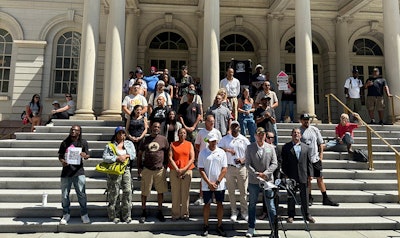
[PRESS RELEASE] – NEW YORK, Aug. 21, 2025 – A coalition of licensed cannabis operators is suing state regulators to block a new interpretation that could force at least 152 retailers to relocate or shut down. The lawsuit (INDEX NO. 908591-25) regarding the abrupt, retroactive policy change was filed Aug. 15 in the New York Supreme Court in Albany against the Office of Cannabis Management (OCM) and the Cannabis Control Board.
Under the banner of "Save New York Legal Cannabis for All," Housing Works Cannabis Co. and 11 other plaintiffs affected by the OCM's policy reversal seek to protect the ability of license holders across New York to operate compliantly in their previously approved locations, having followed every rule set forth nearly three years ago by the state.
"The OCM's actions will jeopardize livelihoods, undermine social equity goals and further encourage consumers to turn to the illicit market," the coalition said in a joint statement. "The state threatens to cement a flawed system that forces taxpaying licensees to start over again, which is something we cannot afford to do."
In July 2025, OCM announced a reinterpretation of how the agency measures the required distance between licensed dispensaries and schools. Through no fault of their own, affected operators are now in a state of noncompliance, threatening their leases and license renewals, access to banking, insurance and the ability to garner investor money. The announcement sent shockwaves through New York, as OCM spent years in community review constructing their proximity policies to create a system that would provide access to safe, regulated cannabis while ensuring operators and communities were supported.
In a statement of support from the Cannabis Retail Alliance of New York (CRANY), President Jeremy Rivera and Director Matthew Robinson said, "We will not allow the foundation of this industry to be shaken by bureaucratic negligence. The livelihoods of real people, working families, local entrepreneurs and legacy operators finally brought into the light are at stake. Communities that have embraced these stores, seen job creation, and felt the benefits of legal, safe access are now being told that their dispensaries are somehow ‘errors.’ That is unacceptable."
Nearly 90% of affected dispensaries were owned by justice-involved individuals, many of whom are Black or Latino. These entrepreneurs were promised a path to generational wealth as a form of restitution for the war on drugs. Women in the industry, already underrepresented, face financial ruin without having made a single sale. Veterans who served their country and returned to invest in their communities are now being pushed out of the legal market they helped pioneer. They all now face crippling debt, eviction or closure.
"We were now facing generational debt at the hands of OCM and New York state," said Osbert Orduna, a service disabled veteran of the Iraq War and the CEO of The Cannabis Place in Queens, New York City.
Relying on OCM's guidelines and prior approvals, the plaintiffs—all Conditional Adult-Use Retail Dispensary (CAURD) or Social and Economic Equity (SEE) licensees—secured leases while awaiting government approval, completed costly buildouts, hired staff, and, in many cases, opened their doors to the public.
"It's a process that can take years and cost an exorbitant amount of money," said Matthew Bernardo, president of the nonprofit Housing Works, which operates the state's first licensed dispensary, Housing Works Cannabis Co., in New York City. "There is a misconception that the cannabis industry is incredibly lucrative and corporate, but the reality is that it's made up of independent small business owners operating on thin margins with high taxes and complicated regulations. Moving is simply not an option."
The suit outlines 10 causes of action, including unlawful rulemaking under the State Administrative Procedures Act (SAPA); arbitrary and capricious agency action; violations of state and federal due process and equal protection clauses; regulatory taking without compensation; and violation of the Marihuana Regulation and Taxation Act's (MRTA) equity mandate.
If granted, the relief sought would annul OCM's reinterpretation of § 72(6), declare the plaintiffs' existing locations compliant and permanently enjoin the state from enforcing the new proximity measurement against them. A preliminary hearing is tentatively scheduled for Aug. 29.
Plaintiffs include:
- Conbud
- The Cannabis Place
- Rezidue
- Summit Canna LLC
- Hush
- High Fade
- Elise Pelka LLC
- Housing Works Cannabis Co.
- Common Courtesy Dispensary LLC
- Toastree LLC
- Monarch Nyc LLC
- Luxe Leaf Boutique LLC























